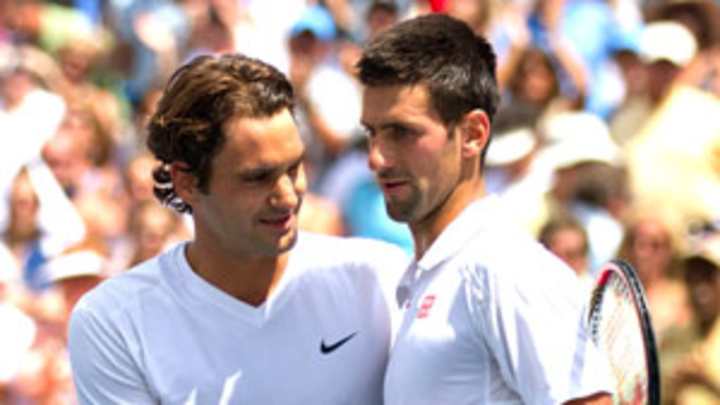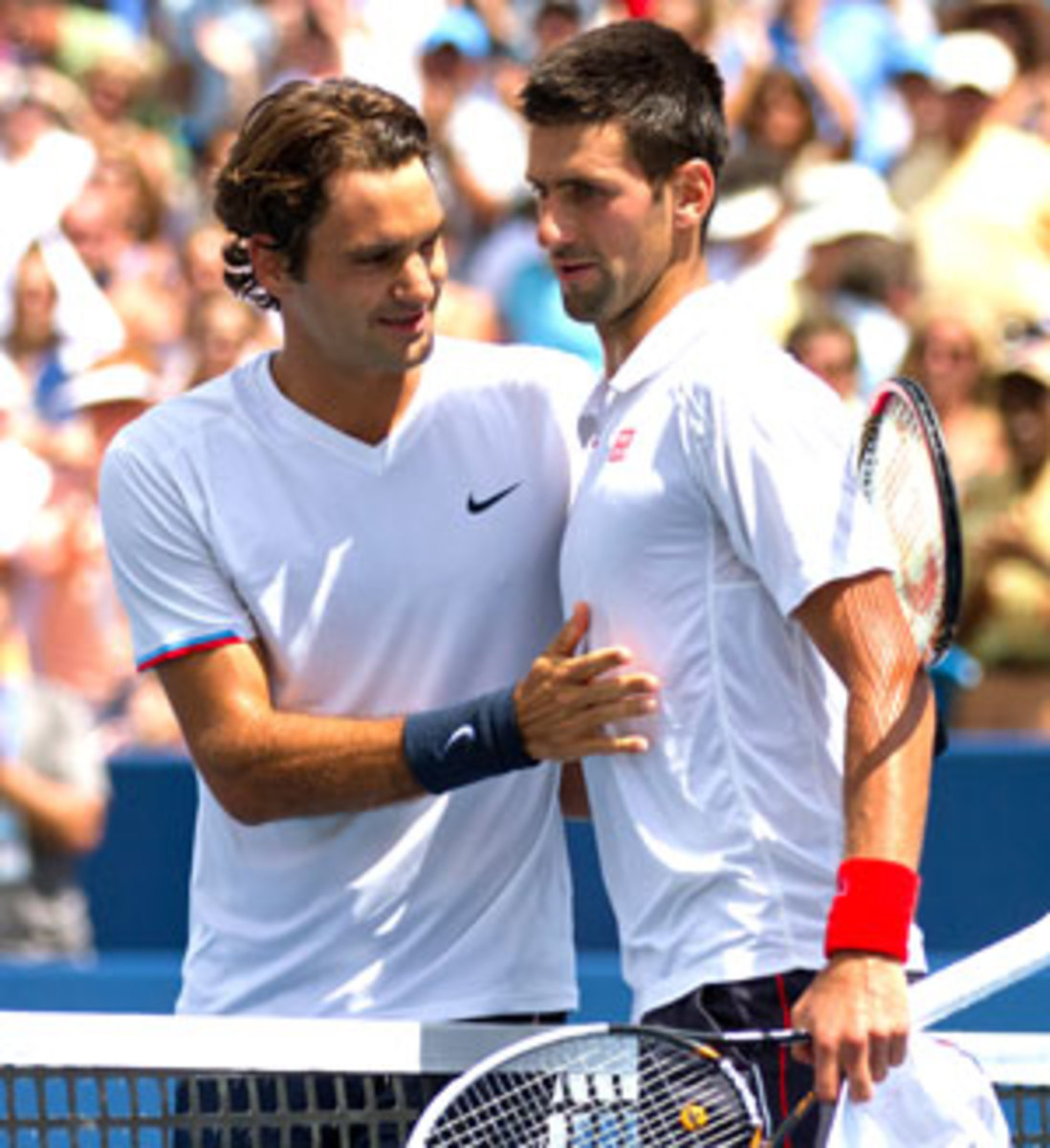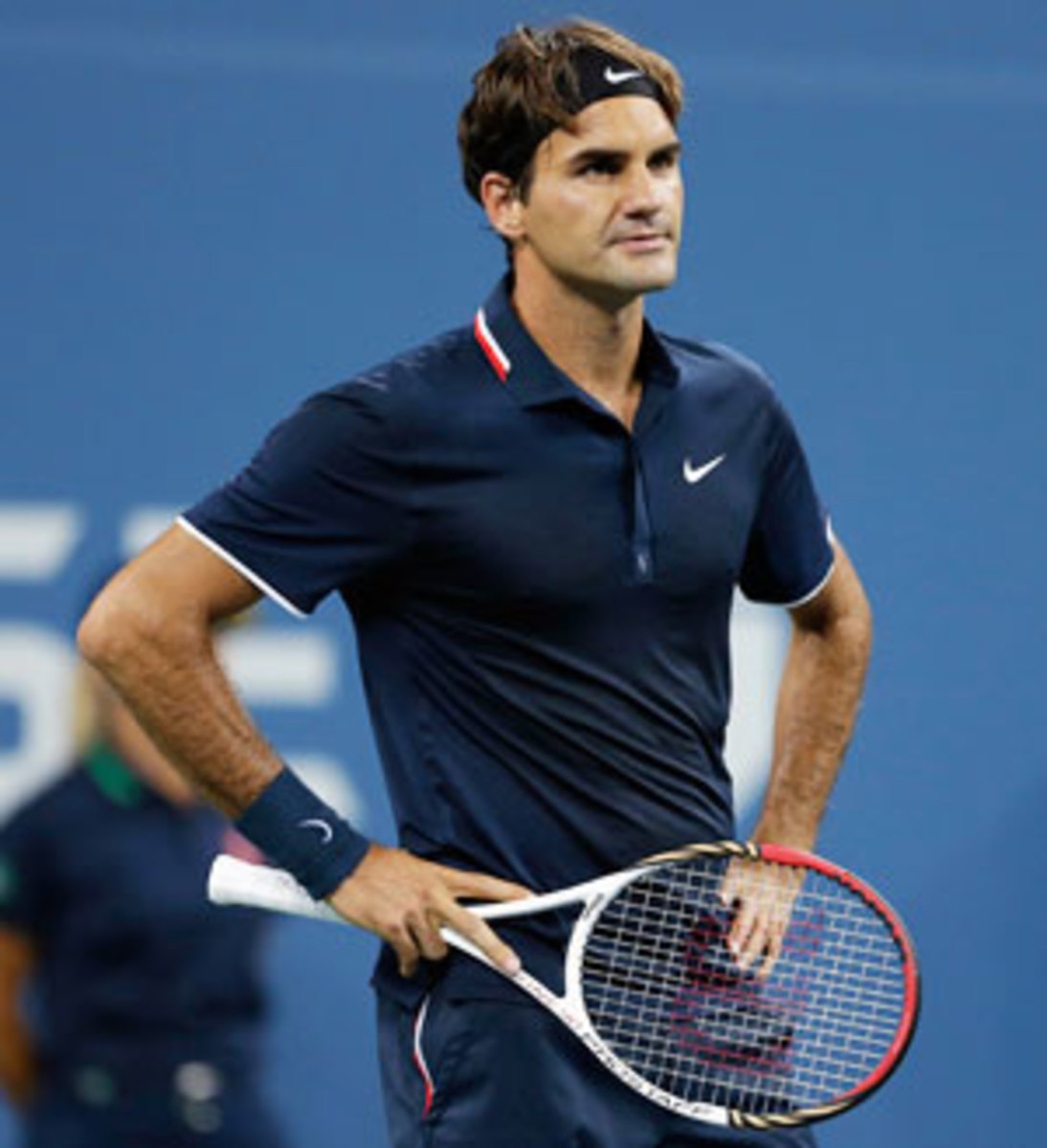The Toss: Making cases for ATP Player of the Year award

Roger Federer and Novak Djokovic have split their 2012 matches, with Federer winning the two most recent matches at Wimbledon and Cincinnati (pictured). (Icon SMI)

Last week on The Toss, we followed Andy Murray’s U.S. Open victory with a look at whether the final against Novak Djokovic was a peek into the next great tennis rivalry. More than half of the readers were not yet convinced.
There has been plenty of ink spilled on Murray’s breakthrough win. So let's step back a bit and put the Grand Slam season in perspective with another debate. Murray's title at the year’s final major marks the first time since 2003 that the calendar’s four Slams were won by four players. Among other firsts, that sure complicates the race for a coveted ATP award.
Today’s Toss: If the season ended today, who wins ATP Player of the Year?
C.W. Sesno: Since the Roger Federer/Rafael Nadal era -- later Djokovic and finally we can include Murray -- the ATP has had an easy formula for deciding the Player of the Year: He who wins the most Slams, wins the award.
Federer won four straight PoY awards from 2004-07, grabbing three majors in each year except ’05, when Marat Safin and Rafael Nadal split the first two, and again in ’09 when Juan Martin del Potro upset the powers that be at the U.S. Open. Nadal took the award in ’08 with two Slams when Djokovic won Melbourne and Federer won Wimbledon, and again in ’10 after sweeping the year's final three Slams. Djokovic, of course, dominated 2011 to win three titles of the major variety and PoY.
So a top-line look might make this season seem a little less clear. SI.com's Bruce Jenkins made the argument that with the equal Slam ledger, the award should be decided in another manner:
Now that the standings are even, this award is best gauged on the emotional scale. ...
The Player of the Year cannot be Nadal, not the way his knee injury so badly curtailed his summer. It can't be Federer, although his career resurgence was marvelous to behold. Djokovic has the credentials, but he had a letdown year in the wake of his 2011 dominance.
Murray's season -- Wimbledon final, Olympic title, first British man to win a major since 1936 -- is the one we'll remember. It wasn't just a soul-satisfying breakthrough for Murray, or tennis-starved Scotland, or the whole of Great Britain. It was a major development in tennis, lending great promise to 2013 and sweeping up the public's attention along the way.
Sorry, Bruce, I'm not buying it. To me, this is an award based in flat-out achievement. So let’s just stick with the numbers and we have our obvious answer: Federer has more wins, more titles, a higher ranking and fewer losses than any other player in contention. That’s one Slam, three Masters shields (to Djokovic’s two and Murray's zilch), one Olympic silver medal in singles and a couple of 500-level titles to clinch the deal. Oh, and did we mention he’s the world No. 1?
Numbers. It's as simple as that. So, Courtney, can I drop the mic and walk off, or do you feel otherwise?
Courtney Nguyen: Now, now, Chris. While I'm not going to argue with your numbers, I do think you're looking at the wrong ones. You're only telling part of the story, and that story doesn't involve Mr. Djokovic.
You can take your Rotterdam titles, Masters shields and win-loss records. I'm going to back the guy who's been inarguably the best at the tournaments that matter the most, the Slams. That guy is Novak Djokovic. He won the Australian Open, made the finals of the French Open and U.S. Open and the semifinals of Wimbledon. No one was more consistent than he was this year, with his three Slam losses going to Nadal on clay, Federer on grass and Murray on hard courts. Those are hard losses, but explainable ones.
In comparison, Federer had the worst Slam season of our viable Player of the Year candidates. He's the only member of the Big Four not to make at least two finals this year and he actually performed worse at the Slams than the man you discount so quickly: Andy Murray. Ranked in order of success, Murray won the U.S. Open, made the final of Wimbledon, the semifinals of the Australian Open and the quarterfinals of the French Open. Federer won Wimbledon, made the semifinals of both the Australian Open and the French Open and the quarterfinals at the U.S. Open. On the whole, Murray actually made it one round further than Federer at the Slams this year.
In addition to more success than the rest at the Slams, Djokovic has been the most consistent man on tour all year. He's played three fewer tournaments than Federer yet the Serb leads in prize money at $7 million to Federer's $6.3 million, a testament to his consistency at the biggest tournaments. In fact, in his 13 tournaments this year, Djokovic lost before the semifinals only once (Janko Tipsarevic, Madrid quarterfinals). Once, Chris. Once.
Compare that to Bruce's boy Andy and it's not even close. As good as Murray's year was at the Slams -- and I do buy Bruce's argument more than you do, Chris -- he was completely invisible outside of them. Obviously, his Olympic gold medal was massive, but if you set aside that victory Murray has won only one non-Slam title this year, and that was all the way back in January in Brisbane. If the season ended today, I think it's a tough case to make for Murray.
Obviously, Djokovic hasn't had a season to match his history-making 201. But that shouldn't be a knock against him when all he's done is still prove himself to be the best player in 2012. As of now, Djokovic is the clear-cut choice. Sure, Federer may be No. 1, but that ranking is flawed for the purposes of this argument because it includes points accumulated in 2011. No, for our discussion, what matters are the Race to London rankings, which only tallies points earned in the 2012 season. Those rankings?
1. Novak Djokovic: 9,910
2. Roger Federer: 8,920
3. Rafael Nadal: 6,840
4. Andy Murray: 6,730.
Boom. Now I'll drop my mic.
Roger Federer's loss to Tomas Berdych in the quarters was his earliest U.S. Open loss since 2003. (AP)

Sesno: Yes! Nothing makes me happier than a Toss full of mic drops, though I’ll admit your argument forced me to realize I didn’t quite B-Rabbit this edition like I hoped. Lots of good points, Courtney, let’s look at them one by one.
You say you buy into Bruce’s argument more than I do. If that’s the case, how can we overlook the significance of what Federer has done this year? Practically every time he takes the court he sets some milestone or breaks another record, continuing his assault on the history books as the greatest of all time. Sure, any player’s current ranking points were partially acquired in 2011. But if an argument in favor of Murray is that he broke through at a Grand Slam for the first time, ending the British major drought and capturing the hearts and minds of the public, doesn’t that too look to factors outside of the 2012 tennis season?
Let’s not forget: Many were quick to write off Federer’s post-U.S. Open run in 2011 as a result of fatigued players ahead of him in the rankings. He was on the tail end of his career and was grabbing easy wins at indoor events. But Federer has debunked that thinking this year. He’s won big titles on every surface, with a Slam on grass and Masters titles on clay and hard. He’s back to No. 1 for the first time in two years, passing Pete Sampras’ mark for most weeks at the top spot. If not for fear of carpal tunnel, I’d continue to list the milestones Federer has set this year.
Moving right along. Your point about their records at Slams is fair, but perhaps also overstating the importance of a single match. Yes, Federer’s quarterfinal loss to Tomas Berdych at the U.S. Open puts him on the short end of any “rounds reached at Slams” argument. And it cost him year-to-date prize money bragging rights as well. (Though I don’t think you want to bring earnings into this debate, as Federer sits at No. 5 on Forbes' highest-paid athletes list. Djokovic? No. 61.) Beating Berdych guarantees Federer at least doubles his U.S. Open take-home. In fact, the difference in their prize money almost exactly matches the difference in their U.S. Open payouts, as Djokovic left with a runner-up check of $950,000 to Federer’s $237,500.
The Race to London rankings are similarly anchored in the U.S. Open results, where Djokovic acquired 840 more points than Federer with a run to the final. All of this is to say your argument against Federer for Player of the Year relies heavily on his U.S. Open performance. Could a little recency bias be coming into play here? And if it comes down to performance at the Slams and the Race points, consider that Nadal leads Murray in Race points despite SKIPPING the year’s final major. Something is awry there.
You say Djokovic has been the most consistent player of the year with 12 semis appearances in 13 tournaments? Federer has fallen before the semis just twice this year, and has played more tournaments. Federer lost to Andy Roddick in Miami, a match he should have won. Djokovic lost to John Isner at Indian Wells, a match he should have won. Federer stepped up to play for his country twice in Davis Cup, going 2-1 in singles. Djokovic has been a no-show (I’m not faulting him, lots of reasons to skip, just sayin’).
Tennis is unlike other sports in that win/loss record isn't the be-all and end-all. Nope, in this fine sport it's about titles. Plain and simple. Same number of Slams? Fine, let's go down a peg. Federer has more Olympic medals, more Masters titles and more 500-level titles. I'd drop the mic again, but the last one landed right on my toe.
Nguyen: I just don't see how you can so quickly discount Slam performance, Chris. The fact is that Federer's results at the four biggest tournaments in tennis, the the ultimate tests in a player's legacy, fall below Djokovic's and Murray's. It's not as simple as saying they all won one Slam and therefore the tiebreaker is Masters shields. If that's the analysis, then Djokovic's year with two Masters shields was no better than Nadal's two clay Masters titles, which was better than Murray's strikeout. With all due respect to Rafa, that's ridiculous.
[polldaddy poll=6548908]
As for your argument that Federer's 2012 was somehow more historically significant than Murray's, I think the ghost of Fred Perry would scoff at you -- in a totally polite and dignified British way, of course -- if not for the fact that he's been banished. As Bruce said, we will look back on 2012 and remember it for being the year that Murray finally made good, snapping a 76-year streak of futility and ruining anyone's attempt to make fun of British tennis for a damn long time. He did it by beating Federer on grass at the Olympics and stopping Djokovic, the defending champion, in New York.
Federer's Wimbledon campaign was ridiculous and his relentless assault on the record books is notable. But did he return home to Switzerland after Wimbledon to a parade of thousands? No, because what he did in winning his 17th Slam and reclaiming No. 1 to break Sampras' record was, as absurd as it sounds, business as usual.
Of course, what we talk about when we talk about Murray is sentimentality and I agree with you, Chris, that bias can tempt us to skew things Murray's way. But numbers don't reflect recency bias. They are stark, they are not swayed by warm-and-fuzzies, and in this case they're pretty clear. We still have more than two months left in the season with a load of points up in the air. I have no doubt we'll have to wait to see how the fall season unfolds until we can confidently designate the man of 2012. But if the season were to end today, Novak Djokovic has accumulated more points than anyone else in 2012. As of now, he's the 2012 Player of the Year.
